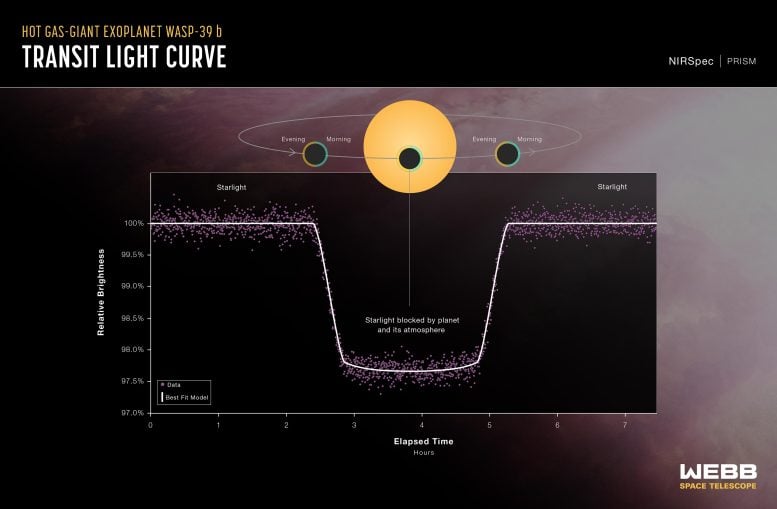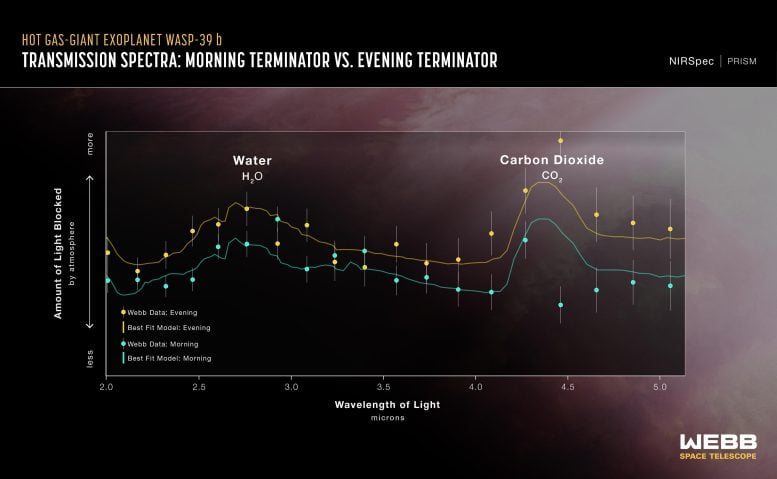
Researchers using the James Webb Space Telescope have uncovered atmospheric differences on the exoplanet WASP-39 b, revealing temperature variations and distinct cloud cover across its tidally locked hemispheres. The planet, similar in size to Jupiter but closer in mass to Saturn, exhibits a hotter evening side compared to its morning side, attributed to powerful atmospheric circulations. Credit: NASA, ESA, CSA, Joseph Olmsted (STScI)
Near-infrared spectral analysis of terminator confirms differences in morning and evening atmosphere.
Since the first exoplanet was discovered in 1992, thousands of planets orbiting stars outside of our solar system have been confirmed through a myriad of different methods, including direct imaging, gravitational microlensing, measuring transits, and astrometry. Over the years, techniques have evolved to study these exoplanets, with astronomers learning details about the atmospheric compositions of these far-off worlds.
NASA’s James Webb Space Telescope is continuing to advance this field of study and deepen our understanding about the diversity of exoplanets and their atmospheres.
The latest? Webb has allowed astronomers to parse out the atmospheric differences between the morning and evening on a tidally locked exoplanet — an incredible achievement for a distant world 700 light-years away from Earth like WASP-39 b.

This artist’s concept shows what the exoplanet WASP-39 b could look like based on indirect transit observations from NASA’s James Webb Space Telescope as well as other space- and ground-based telescopes. Credit: NASA, ESA, CSA, Ralf Crawford (STScI)
Webb Space Telescope Investigates Eternal Sunrises, Sunsets on Distant World
Researchers using NASA’s James Webb Space Telescope have finally confirmed what models have previously predicted: An exoplanet has differences between its eternal morning and eternal evening atmosphere. WASP-39 b, a giant planet with a diameter 1.3 times greater than Jupiterbut similar mass to Saturn orbits a star about 700 light-years away from Earth, is tidally locked to its parent star. This means it has a constant dayside and a constant nightside—one side of the planet is always exposed to its star, while the other is always shrouded in darkness.
Using Webb’s NIRSpec (Near-Infrared Spectrograph), astronomers confirmed a temperature difference between the eternal morning and eternal evening on WASP-39 b, with the evening appearing hotter by roughly 300 Fahrenheit degrees (about 200 Celsius degrees). They also found evidence for different cloud cover, with the forever morning portion of the planet being likely cloudier than the evening.
This animation describes how Webb uses transmission spectroscopy to study the atmospheres of distant exoplanets. Credit: NASA, ESA, CSA, Leah Hustak
Advancements in Exoplanet Atmospheric Studies
Astronomers analyzed the 2- to 5-micron transmission spectrum of WASP-39 b, a technique that studies the exoplanet’s terminator, the boundary that separates the planet’s dayside and nightside. A transmission spectrum is made by comparing starlight filtered through a planet’s atmosphere as it moves in front of the star, to the unfiltered starlight detected when the planet is beside the star. When making that comparison, researchers can get information about the temperature, composition, and other properties of the planet’s atmosphere.
“WASP-39 b has become a sort of benchmark planet in studying the atmosphere of exoplanets with Webb,” said Néstor Espinoza, an exoplanet researcher at the Space Telescope Science Institute and lead author on the study. “It has an inflated, puffy atmosphere, so the signal coming from starlight filtered through the planet’s atmosphere is quite strong.”

A light curve from NASA’s James Webb Space Telescope’s NIRSpec (Near-Infrared Spectrograph) shows the change in brightness from the WASP-39 star system over time as the planet transited the star. This observation was made using NIRSpec’s bright object time-series mode, which uses a grating to spread out light from a single bright object (like the host star of WASP-39 b) and measure the brightness of each wavelength of light at set intervals of time. Credit: NASA, ESA, CSA, Ralf Crawford (STScI)
Temperature and Atmospheric Composition Insights
Previously published Webb spectra of WASP-39b’s atmosphere, which revealed the presence of carbon dioxide, sulfur dioxide, water vapor, and sodiumrepresent the entire day/night boundary – there was no detailed attempt to differentiate between one side and the other.
Now, the new analysis builds two different spectra from the terminator region, essentially splitting the day/night boundary into two semicircles, one from the evening, and the other from the morning. Data reveals the evening as significantly hotter, a searing 1,450 degrees Fahrenheit (800 degrees Celsius), and the morning a relatively cooler 1,150 degrees Fahrenheit (600 degrees Celsius).

This transmission spectrum, captured using Webb’s NIRSpec (Near-Infrared Spectrograph) PRISM bright object-time series mode, shows the amounts of near-infrared starlight blocked by the atmosphere of hot gas giant exoplanet WASP-39 b. The spectrum shows clear evidence for water and carbon dioxide, and a variation in temperature between the morning and evening on the exoplanet.
New analysis of the transmission spectrum of WASP-39 b builds two different spectra from the stationary day/night boundary on the exoplanet, essentially splitting this terminator region into two semicircles, one from the evening, and the other from the morning. Data reveals the evening as significantly hotter, a searing 1,450 degrees Fahrenheit (800 degrees Celsius), and the morning a relatively cooler 1,150 degrees Fahrenheit (600 degrees Celsius).
The blue and yellow lines are a best-fit model that takes into account the data, the known properties of WASP-39 b and its star (e.g., size, mass, temperature), and assumed characteristics of the atmosphere.
Credit: NASA, ESA, CSA, Ralf Crawford (STScI)
Implications of Temperature Variations
“It’s really stunning that we are able to parse this small difference out, and it’s only possible due Webb’s sensitivity across near-infrared wavelengths and its extremely stable photometric sensors,” said Espinoza. “Any tiny movement in the instrument or with the observatory while collecting data would have severely limited our ability to make this detection. It must be extraordinarily precise, and Webb is just that.”
Extensive modeling of the data obtained also allows researchers to investigate the structure of WASP-39 b’s atmosphere, the cloud cover, and why the evening is hotter. While future work by the team will study how the cloud cover may affect temperature, and vice versa, astronomers confirmed gas circulation around the planet as the main culprit of the temperature difference on WASP-39 b.
Understanding Planetary Wind Patterns and Temperature Dynamics
On a highly irradiated exoplanet like WASP-39 b that orbits relatively close to its star, researchers generally expect the gas to be moving as the planet rotates around its star: Hotter gas from the dayside should move through the evening to the nightside via a powerful equatorial jet stream. Since the temperature difference is so extreme, the air pressure difference would also be significant, which in turn would cause high wind speeds.
Using General Circulation Models, 3-dimensional models similar to the ones used to predict weather patterns on Earth, researchers found that on WASP-39 b the prevailing winds are likely moving from the night side across the morning terminator, around the dayside, across the evening terminator and then around the nightside. As a result, the morning side of the terminator is cooler than the evening side. In other words, the morning side gets slammed with winds of air that have been cooled on the nightside, while the evening is hit by winds of air heated on the dayside. Research suggests the wind speeds on WASP-39 b can reach thousands of miles an hour!
Future Research Directions and Webb’s Early Science Contributions
“This analysis is also particularly interesting because you’re getting 3D information on the planet that you weren’t getting before,” added Espinoza. “Because we can tell that the evening edge is hotter, that means it’s a little puffier. So, theoretically, there is a small swell at the terminator approaching the nightside of the planet.”
The team’s results have been published in the journal Nature.
The researchers will now look to use the same method of analysis to study atmospheric differences of other tidally locked hot Jupiters, as part of Webb Cycle 2 General Observers Program 3969.
WASP-39 b was among the first targets analyzed by Webb as it began regular science operations in 2022. The data in this study was collected under Early Release Science program 1366, designed to help scientists quickly learn how to use the telescope’s instruments and realize its full scientific potential.
Reference: “Inhomogeneous terminators on the exoplanet WASP-39 b” by Néstor Espinoza, Maria E. Steinrueck, James Kirk, Ryan J. MacDonald, Arjun B. Savel, Kenneth Arnold, Eliza M.-R. Kempton, Matthew M. Murphy, Ludmila Carone, Maria Zamyatina, David A. Lewis, Dominic Samra, Sven Kiefer, Emily Rauscher, Duncan Christie, Nathan Mayne, Christiane Helling, Zafar Rustamkulov, Vivien Parmentier, Erin M. May, Aarynn L. Carter, Xi Zhang, Mercedes López-Morales, Natalie Allen, Jasmina Blecic, Leen Decin, Luigi Mancini, Karan Molaverdikhani, Benjamin V. Rackham, Enric Palle, Shang-Min Tsai, Eva-Maria Ahrer, Jacob L. Bean, Ian J. M. Crossfield, David Haegele, Eric Hébrard, Laura Kreidberg, Diana Powell, Aaron D. Schneider, Luis Welbanks, Peter Wheatley, Rafael Brahm and Nicolas Crouzet, 15 July 2024, Nature.
DOI: 10.1038/s41586-024-07768-4
The James Webb Space Telescope (JWST) is a large, space-based observatory launched on December 25, 2021. It’s a collaborative project involving NASA, the European Space Agency (ESA), and the Canadian Space Agency (CSA). As the scientific successor to the Hubble Space TelescopeJWST is designed to provide unprecedented resolutions and sensitivities in the infrared range of the electromagnetic spectrum. This capability allows astronomers to study every phase of cosmic history—from the first glows after the Big Bangto the formation of solar systems capable of supporting life on planets like Earth, to the evolution of our own Solar System. Positioned at the second Lagrange point (L2), JWST will explore a wide range of scientific questions, helping to uncover new insights into the universe’s structure and origins.





